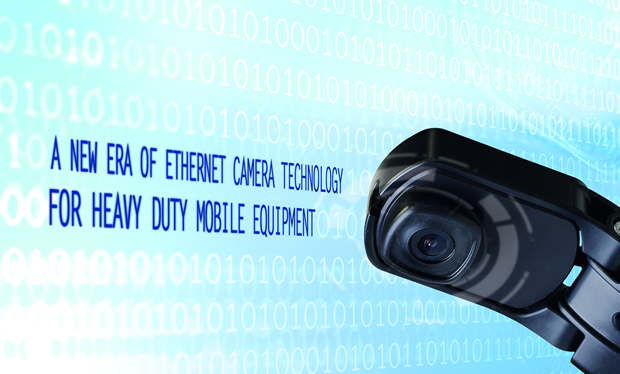Shock-resistant Ethernet camera displays images in real time
A shock-resistant Ethernet camera with a 100Mb/s connection has been introduced by Orlaco. The images produced by the EMOS are for all intents and purposes displayed in real time. The camera is also suitable for use in extreme conditions, making it usable on trucks, cranes, heavy construction and mining equipment, semi-automatic or remote controlled vehicles and more.
Worldwide, more and more vehicles are being equipped with an Ethernet interface. By introducing an Ethernet camera, Orlaco is catering to this development. Orlaco's EMOS camera is small (55x60x24mm), light (150g) and energy efficient (<2W). The EMOS is available with angles of view of 180, 120 and 90°. The 60° and 30° angles of view will be introduced to the market later this year.
Orlaco's camera is up and operational within two seconds. A feature of the EMOS is that it transfers images to the monitor in real time, a feat that, as yet, no other Ethernet camera is capable of. The camera's maximum latency is 48ms at 30FPS, and 31ms at 60FPS. In combination with a common hardware processing platform, such as the IMX6 or ARM, the total latency of the camera-monitor system is less than 100ms.
The EMOS carries CMOS chip technology and contains integrated corrections, such as automatic white balance, photometric and geometric lens correction, mirror imaging and the ability to rotate images 180°. Users are assured of crystal clear images with a maximum camera output of 60 FPS at 720p SDR to 43 FPS at 960p HDR. Thanks to the sensor's high degree of light sensitivity (0.05 Lux), the EMOS also offers superb night vision.
The EMOS is designed to perform under the most challenging of conditions. The camera is shock-resistant (50G), vibration-resistant (15GRMS at a frequency of 24-2,000Hz) and can handle temperatures from -40 to 85ºC. The EMOS has an aluminium housing with 2k molding and is completely waterproof (IP68/IP69k). It can even be used underwater up to a depth of 10m. This makes the EMOS camera suitable for, among other things, trucks, cranes, and heavy construction and mining equipment. It furthermore can be deployed on semi-automatic or remote controlled vehicles and machines that operate according to image recognition.

The EMOS is connected using a M12 D-coded connector for data. A shielded cable with sprayed-on connector provides excellent EMC performance (100V/m). The camera can be directly connected to the vehicle's power supply (8-32V) and the power supply is protected from peak voltage, overvoltage, jump starts, spikes and ripples.
Via the RTP and AVG protocols, the camera is able to stream MJPEG or H.264. The ISO17215 protocol is used to communicate with the camera. This includes setting the resolution, mirroring the image and starting/stopping streaming. For extra safety and ease of use, it is also possible to display overlays (text, arc, line, image and safety ticker) as desired.





